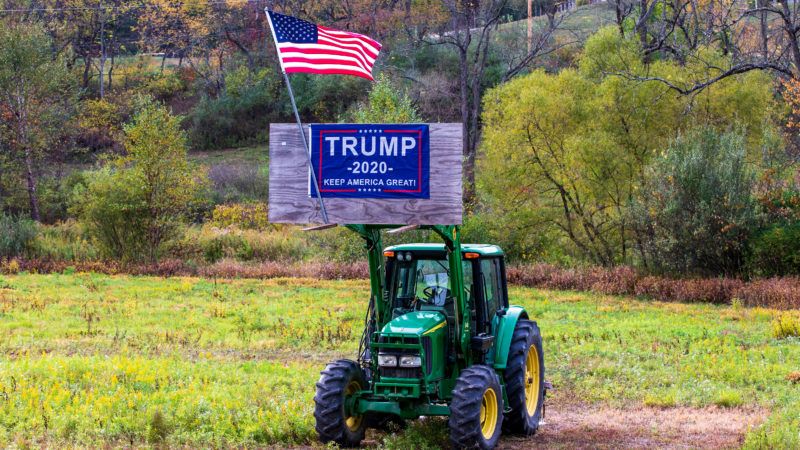The Feds Have Doled Out Record Farm Subsidies To Save Trump's Campaign
There's an easier way to lessen the impact of retaliatory agriculture tariffs: repeal our own

With the presidential election now just over two weeks away, President Donald Trump has mounted a frantic effort to ensure America's farmers, a key Trump voting bloc, will support his flagging re-election campaign. In short, he's shoving piles of cash their way.
The New York Times details the "gush of funds" Trump has promised U.S. farmers—with more on the way. Some say total farm subsidies could top $40 billion this year. The Times says the figure may be as high as $46 billion. Either figure would be a record.
Generally, it appears Trump may see this sort of "massive pre-election stimulus" as his best hope for reelection.
Critics have seized on the manner in which the Trump administration is subsidizing farmers—mostly outside of the traditional (though also lousy) programs funded under the five-year Farm Bill.
"[T]he bulk of USDA payments to farmers since 2017 have flowed through stop-gap programs created by the Trump administration, with payment limits far larger than those that apply to the traditional farm program," Successful Farming reported in August.
The combination of farm subsidies included in the current Farm Bill and subsidies doled out under Trump's executive order means, the Times reports, that two out of every five dollars American farmers receive this year will come directly from taxpayers.
Critics, including many Democrats, argue the funds are being doled out as political favors. They appear to have a point. Last month, for example, during an election rally in Wisconsin, Trump announced additional payments to farmers totaling $13 billion.
Non-partisan observers have also labeled them political handouts. "The Government Accountability Office found last month that $14.5 billion of farm aid in 2019 had been handed out with politics in mind," The Week reports. The Times, citing the same GAO report, also highlighted by some Democrats, shows farm subsidies last year appeared to be directed to "big farms in the Midwest and southern states," mirroring at least some segments of Trump's farm base.
That same base has been hit hard by tariffs championed by Trump. In 2018, I predicted (as did many others) that Trump's international trade tariffs would spur retaliatory tariffs and harm U.S. farmers and consumers in the process. They did just that.
But because Trump's tariffs hurt U.S. farmers, and because he wants them to vote for him again, he's sending them cash. That cash even has a name. Last year, one farmer NPR food-policy writer Dan Charles spoke with says he and his fellow farmers have taken to referring to the tariff-induced subsidies as "Trump money."
"The U.S. Department of Agriculture simply sent [the farmer] a check to compensate him for the low prices resulting from the trade war," Charles explains.
Most of Trump's subsidies have gone to large producers.
"Despite the record amount of farm welfare payments doled out by this administration, the smaller struggling family farmers get next to nothing while wealthy landowners and massive, highly profitable agribusiness hoover up most of the federal dollars," says Don Carr, a senior advisor with the Environmental Working Group, in an email to me this week. "I'm old enough to remember when a Minnesota millionaire qualifying for a puny food stamp benefit was a scandal, yet few feathers get ruffled when rich land barons collect million-dollar government welfare checks."
All of these payments are wrongheaded and unnecessary—whether to big or small producers—as I detail in my book, Biting the Hands that Feed Us.
In a Chicago Tribune op-ed this week, Wisconsin farmer and advocate Danielle Endvick explains that while the record farm subsidies are "deeply appreciated," taking buckets of "Trump money"—she notes federal farm payments have "nearly tripled since 2017"— "feels just a little bit dirty" during the election season.
She's right. Everything feels dirty during the election season. But Trump's taxpayer handouts to farmers just feels a little bit dirtier.


Show Comments (342)